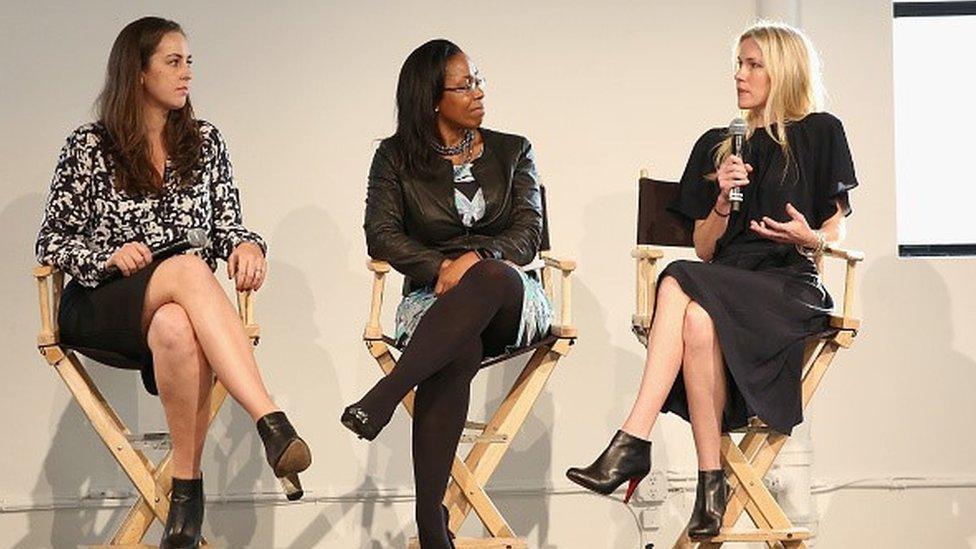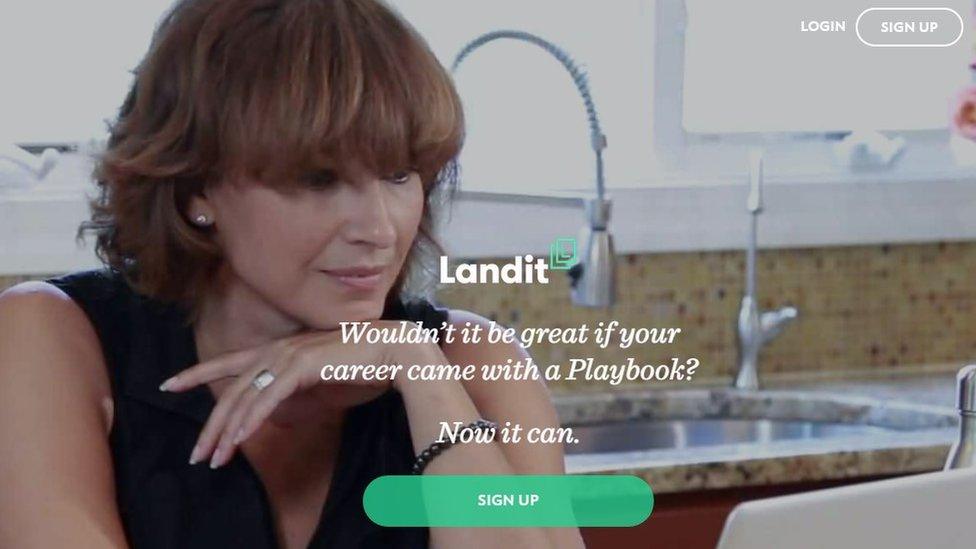The career crisis that sparked a 'LinkedIn for women'
- Published

"I was stuck," says Lisa Skeete Tatum. "For the first time in my life, I didn't know what my next move looked like. And it felt really crappy."
However, she didn't feel like she was alone in that. Around the time of having those thoughts, she attended a Harvard Business School conference celebrating 50 years of female attendees, and found lots of her peers in a similar situation.
"There were so many women who were looking for what's next. We all put on 'the face' but on the inside we're all trying to figure out what's next. For women there's a bigger social cost to admitting you're vulnerable."
That someone with a background as impressive as Lisa's was ever stuck seems surprising.

More stories for International Women's Day

She had changed her career several times already, starting out as a chemical engineer, then deciding to move into venture capital - investing in small and start-up companies - which required going back to college to study.
But that feeling of not knowing what to do next prompted her to set up Landit - a networking site aimed at helping women with their careers, dubbed by some as a "LinkedIn for women" (though men are also welcome).
'Land your it'
She doesn't seem to mind the comparison too much - she thinks her site offers more but, of course, dreams of being as well-known as LinkedIn, which she describes as a great company.
Not yet a year old, Landit - so-called because it is designed to help you "land your it" - is still small. It has seven employees and its subscribers are "in the thousands and thousands", although Lisa tells me it has seen a doubling of its users over the past two months.
The company has raised $2m (£1.6m) in funding from investors and is currently in the throes of negotiating a second round.
Now in her 40s, New-Jersey born Lisa had worked in venture capital for 11 years, but also sat on the boards of many non-profit companies. She wanted to do something with more social impact but didn't know how to go about making her next move.
And so she launched Landit, together with a friend she met while studying at business school.

Lisa Skeete Tatum (centre) believes women need most help in the middle of their careers
"When you first get out of school you have a lot of resources and lots of people to help you, but when you get further along it gets really tricky," she says.
But all of this surely applies to men as well? Isn't she just describing classic mid-life crisis symptoms that afflict everyone regardless of gender? Why do we think that men have all the magic answers to those problems?
'Selling me the moon'
Lisa argues that men have a better social network for dealing with the situation. She says they, generally, have more confidence - warranted or not - and are more likely to be part of networks that provide better access to mentors and advisers, as well as providing opportunities to hear about potential career openings. Women, on the other hand, are more likely to feel like they don't know where to start.
Referring to her days in venture capital, she describes how "men would pitch [to] me and they're selling me the moon", despite the fact that they may not have had a job before, while women would more often come in and ask for a little bit of money and "no-one wants to invest in incremental".

Landit has thousands of users and says its membership is growing
"There's a formula [for success], just like there's a formula for getting into business school. There are basic rules for success and often we're not privy to that," she argues.
And by the way, she says, who knew that so many senior management figures had coaching? It's one of those secrets of the top that she only discovered late in life, she adds. One of her "you don't know what you don't know" examples.
"If you make it through to the end [of your career] - that's when you start getting coaching. But [in between] there's the big forgotten middle," Lisa says.
It's that "middle" that Landit aims to help with - offering not just networking opportunities, but career advice, coaching and help with CVs.
"I don't want to be a 'nice to have'," she states. Having a more diverse workforce is "a business imperative" as it makes firms "more competitive", she says.
The site is not just for individuals. Companies such as the financial software and media firm Bloomberg and the investment management firm BlackRock have also signed up - in the hope that it will encourage women within their organisations.

Lisa's tips for setting up a business

Choose your investors and advisers wisely. It's important to have people around you who you can call on
Get comfortable with rejection - whether it's from fundraising, a product mistake or people telling you your baby's ugly, you have to be able to take it
Don't be afraid to make decisions quickly, even with imperfect information. If something isn't working - change it
Lisa's tips for career development
Keep a weekly diary of your success
Get coaching
When it comes to "imposter syndrome" - crush it

Despite her previous experience, Lisa says she found raising money really challenging.
"I certainly encountered some interesting situations. If I hadn't worked in venture capital, some of the comments maybe would have taken me aback. It made me think what a nice venture capitalist I was," she says.
When pressed, she won't elaborate on any really rude comments but says there were undertones of: "What is a woman like you doing asking for my money?"
One investor who was impressed with both Lisa and the pitch was Tony Tjan, chief executive of the investment firm Cue Ball.
He has known Lisa for about 20 years - they first met at Harvard Business School. He makes a point of investing in companies that he feels have good leaders - and he puts Lisa firmly in that category, describing her as "highly dynamic and exceptionally driven".
Within 48 hours of meeting to discuss his investment, in which he had said he was interested in principle, Lisa emailed him wanting to know how much he was putting on the table. "Very Lisa," he says. "A bit cheeky but very sincere."
- Published27 February 2017
